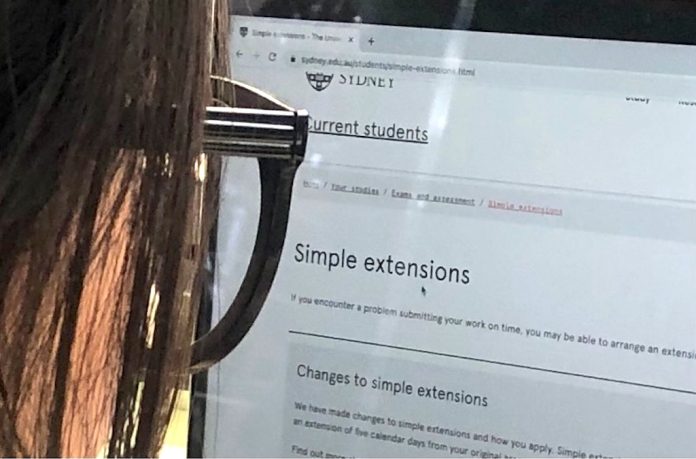University of Sydney is looking to change the way simple extensions work after management considered shifting from five-day to three-day extensions, which could lead to negative effects on students’ mental health.
Tom Clark, an accredited Mental Health First Aid (MHFA) instructor, said the decision to shorten extension periods will increase mental stress. Mr Clark has worked as the director and counsellor at a youth crisis centre for three years and was running workshops in mental health for various organisations.
“The pressure of study is a huge concern for any student, despite their grades,” he said.
“The university should be taking means to encourage better mental health and this decision will undoubtedly have the opposite effect.”
The most recent National Study of Mental Health and Wellbeing found that one in five Australians aged 16 to 85 experience some form of common mental illness in any year.
Tia Wei, 23, studies for the Master of Media Practice in Semester 1 at the University of Sydney and she studied International Business at the China University of Geosciences Beijing. She applied for simple extensions twice before semester mid-term.
“The huge changes in language and majors made it difficult for me to adapt to new study life in a short time,” she said.
“At the first eruption of the assignments this semester, I was confused about many assignment details, both academic and technical.
“When assignment due dates were approaching, the anxiety made me [unable] to concentrate at all, so I had to apply for simple extensions.”
Ms Wei said she planned to apply for more simple extensions at the end of the semester.
“I wish I could get rid of the bad habit of procrastination,” she said. “However, submitting six assignments within two weeks could wear me down.”
Save five-day extensions
The Sydney University Postgraduate Representative Association (SRC) collected 901 responses from students about the possible reduced simple extension time after conducting an online survey on April 19.
Respondents were 61 per cent undergraduates and 39 per cent postgraduates who came from diverse backgrounds and life experiences.
The results showed that 873 students believed the reduced time could have negative effects on their mental health and 98 per cent of students prefer the university to retain simple extensions at five days.
SRC president Lia Perkins said they will keep supporting five-day simple extensions.
“We will continue to say the five days are the best policy,” she said. “We think it will be disappointing if the university chooses not to listen to students.
“The university’s decision should be much more in consultation with staff and students rather than whatever the university management decided.”
 The number is increasing
The number is increasing
Dr Brittany Ferdinands, Social Media Communication head tutor and sessional academic, said she noticed an increasing trend in the number of students requesting five-day simple extensions. She has been teaching at USyd for five-and-a-half years and teaches around seven classes per semester.
“I usually need to grade 30 to 100 assignments at a given time,” she said. “When a significant proportion of students request extensions, it can impact my workload as it requires additional time and effort to manage and process the extension requests, which could affect the ability to provide timely feedback to students.”
Dr Ferdinands said she had mixed feelings about the reduced time for simple extensions.
“It could be a double-edged sword,” she said. “Reducing the simple extension from five days to three days could potentially impact students because it may limit their flexibility in managing their workload and accommodating unexpected circumstances.
“However, it can also encourage better time management and prompt students to plan and complete their assignments within the original deadline.”
She said guiding and supporting students in managing their assignments and academic stress is essential.
“This can include encouraging time management skills, promoting self-care, and emphasising the importance of self-care and stress management techniques,” she said. “As a tutor, I can offer clarification and guidance and provide constructive feedback. For anything else, I will refer students to support services.”
Mr Clark said mental health first aid encourages self-care and four ways to support self-care – the MEDS. These are:
“M is practising mindfulness or meditation for at least some minutes every day to keep yourself grounded. Apps like Smiling Mind, Calm or Headspace etc. are great for this,” he said. “E is getting plenty of exercise. It stimulates the brain cells and releases the neurotransmitters that will help you study well.
“D is having a very healthy diet. Some recent studies have shown that highly processed foods like those wrapped in plastic in a supermarket will be exacerbating any depression a person may have.
“S is getting adequate and good quality sleep. Anyone taking hours to get to sleep or waking up very early and can’t get back to sleep for three or more nights – and this is happening for three or more months – will have serious mental health issues. They should be encouraged to get help from a doctor.”


